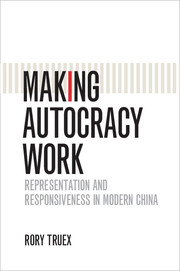Book contents
8 - Conclusion
Published online by Cambridge University Press: 13 October 2016
Summary
Summary of Findings
This book began with a set of questions on the nature of representation and legislative institutions in authoritarian systems, and I have sought some preliminary answers through a detailedmicroanalysis of the Chinese case. Authoritarian parliaments, or at least the NPC, can fill an informational role by revealing citizen grievances, but they bring the risk of additional publicity on sensitive political issues. The current CCP regime is trying to engineer a system of representation within bounds using a combination of rents, socialization and career incentives. Deputies themselves are not tone-deaf and seek to convey constituent interests on a broad range of nonsensitive issues. They do so not because of electoral accountability from below, but because of top-down accountability to the regime itself. The net result is a docile but useful parliament, one that conveys public opinion but remains loyal to the CCP on policies core to the oneparty state.
Much of the book is dedicated to testing the observable implications of the framework using new data on the backgrounds and behaviors of NPC deputies. Below is a summary of the core findings. Each empirical chapter roughly corresponds to one outcome measure: influence, representation, selection, and rents.
Influence (Chapter 3)
– Roughly half of randomly selected opinions from the Hainan Provincial People's Congress appear to have a tangible influence on the policy outcomes. There are no proposals in the Hainan dataset that call for political reforms. See Tables 3.1 and 3.2.
– Original public opinion data show that Chinese citizens perceive partial responsiveness in the NPC system. Highly popular policies are perceived as being more likely to be adopted, but not if they propose political reform. See Figure 3.4.
Representation (Chapter 4)
– At the provincial level, publicly available NPC deputy proposals and comments from 2008 to 2012 display congruence with constituent opinion/intensity measures constructed from the 2008 China Survey and demographic variables. See Tables 4.2 and 4.3 and Figure 4.2.
– Shocks to public opinion appear to be met with a legislative response, but not for strong preference issues. See Figures 4.3 and 4.4.
Selection (Chapter 5)
– After matching on demographic and professional characteristics, deputies who are reselected into the 12th NPC have about 20–50% more publicly available proposals than deputies who are not. An additional proposal seems to increase the probability of reselection by about 2%. See Table 5.3.
- Type
- Chapter
- Information
- Making Autocracy WorkRepresentation and Responsiveness in Modern China, pp. 176 - 190Publisher: Cambridge University PressPrint publication year: 2016



